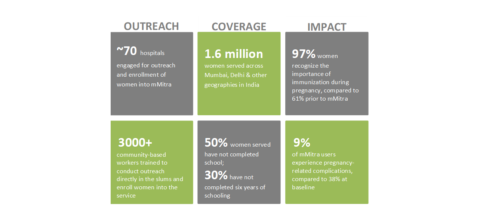What is Giving Compass?
We connect donors to learning resources and ways to support community-led solutions. Learn more about us.
Search our Guide to Good
Start searching for your way to change the world.
Every 10 minutes in India, a woman dies from complications arising during pregnancy and childbirth (mortality) and many more are left with injuries leading to life-altering disabilities and suffering (morbidity). This makes India accountable for 17 percent of maternal deaths worldwide. The picture is also dismal with regards to children, with one in five newborn deaths worldwide, occurring in India, and the under-5 mortality being as high as 50 per 1000 live births. Much of this is the plight of low-income groups in the country. And almost all these deaths are easily avoidable. This leaves India with a lot to achieve, before it can meet its health-related sustainable development goals for 20301.
As health systems in Low and Middle Income Countries (LMICs) strive to provide universal coverage without corresponding increase in the number of health facilities and staff, existing providers are expected to serve increasing numbers of clients, leading to de-prioritization of the non-technical components of care such as health communication and counseling2 3. This is particularly concerning in the case of maternal and child healthcare, where better informed mothers are more likely to secure better health for their children and themselves by using care in the event of childhood illness, adopting safe delivery practices and initiating early breastfeeding, to name a few best practices4.
It is this crucial gap, in providing timely, life-saving information to prospective and new mothers, that the nonprofit ARMMAN addresses through its mMitra program.
mMitra: A Scalable Solution for Sharing Valuable Health Guidance
mMitra5, a program run by the Mumbai-based non-profit ARMMAN, is a mobile phone-based, free voice call service that provides preventive care information towards reducing maternal and under-five mortality and morbidity, to underserved, slum-dwelling communities in India. The program partners with hospitals and community-based organizations to inform women about mMitra and enroll them into the service. The calls are weekly, culture-sensitive and provide health information corresponding to a woman’s stage of pregnancy or age of her child. Being a voice call and not a text-based service, mMitra benefits literate and illiterate women alike. It leverages the high penetration and use of mobile phones in India to create a program that can be scaled across the country.
 But the impact of mMitra goes beyond the numbers. It is reflected in the stories of women whose lives were positively impacted through the program.
But the impact of mMitra goes beyond the numbers. It is reflected in the stories of women whose lives were positively impacted through the program.
Mahi registered with mMitra when she was 2 months pregnant with her second daughter. She reminisces that the calls provided very comprehensive information, much of which she had not known during her first pregnancy. Elders from the family or community do not share everything with a pregnant woman for fear that she might get too worried. But mMitra calls informed her about every little aspect of pregnancy – what to eat, what developments to expect in the fetus and its position, what to be careful about, and other things that helped increase her preparedness and confidence to manage the changes she was undergoing during her pregnancy.
mMitra calls also helped Mahi post-delivery, especially with correction of her breastfeeding practice. All through her first pregnancy Mahi fed through only one breast, not knowing that she can and should feed through both. But the mMitra calls helped change this during her second pregnancy, encouraging her to feed with alternative breast each time, and remember which side she fed from by wearing a bangle in that hand6.
Mahi is one among the 1.6 million women mMitra helps through such simple yet crucial advice. By helping reduce maternal and child mortality and morbidity among the population it serves, ARMMAN’s mMitra program helps India inch closer to achieving its sustainable development goals on good health and well-being. But more importantly, mMitra serves as a constant companion and reliable advisor to expectant and new mothers, thereby enabling each woman to realize her basic rights to a well-informed and safe pregnancy, and to a healthy and happy motherhood.
____
By Anantvijay Singh, Associate at Dasra.
Sources:
1. Hogan, M.C., Foreman, K.J., Naghavi, M., Ahn, S.Y., Wang, M., Makela, S.M., Lopez, A.D., Lozano, R. and Murray, C.J., 2010. Maternal mortality for 181 countries, 1980–2008: a systematic analysis of progress towards Millennium Development Goal 5. The lancet, 375(9726), pp.1609-1623.
2. WHO. 2018. Global Health Observatory data.
3. Sugunadevi, G., 2017. Quality of antenatal care services at sub-centres: an infrastructure, process and outcome evaluation in a district in Tamil Nadu. International Journal Of Community Medicine And Public Health, 4(11), pp.4071-4077.
4. Soubeiga, D., Gauvin, L., Hatem, M.A. and Johri, M., 2014. Birth Preparedness and Complication Readiness (BPCR) interventions to reduce maternal and neonatal mortality in developing countries: systematic review and meta-analysis. BMC pregnancy and childbirth, 14(1), p.129.
5. mMitra translates to Mobile Friend
6. Adapted from https://armmanblog.wordpress.com/2016/08/22/a-little-care-makes-all-the-difference/.
Sources for infographic:
- 70 percent of hospitals
- 3,000 community-based workers
- 1.6 million women served
- 50 percent education: ARMMAN internal data report, 2018
- 97 percent immunization importance: Hegde, A. et.al. 2016. Assessing the impact of mobile-based intervention on health literacy among pregnant women in urban India.
- 9 percent pregnancy complications
Categories:
- Gender Equity
- India
- Health (Other)